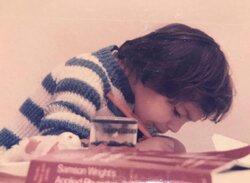Running by the Charles River: The Passion for Research that led me to Harvard
6 minute read
My journey to grad school was by no means a linear one but it was one that was strung together by a constant: the pure love for research and learning new things. In fact, I’m of the firm belief that all humans are innate researchers from birth. What do I mean by this? I mean that as babies we excitedly learn new things every day, knowledge that we instinctively collect, organize, and examine in order to increase our understanding of the world that surrounds us. At its core, that is what research is: the curiosity to discover what we don’t know by gathering and analyzing as much information about it as possible.
This very curiosity is what pushed me to undertake a variety of research projects throughout my life, starting from an in depth analysis of frogs living in marshes near my house when I was a kid, to anthropological research of various cliques in my high school as a teen, to a failed biology experiment where I tried to find a connection between plant growth and music for my International Baccalaureate Extended Essay. That was just the start of the fundamental presence of project-based learning in my life! In undergrad at the American University in Cairo, because I chose to major in International Relations and minor in Theater, I had the chance to research and write papers on everything ranging from the 1994 Genocide in Rwanda to the History of Mask Making in Commedia del Arte. For my first master’s degree at the American University in Cairo, I wrote a thesis on how decisions made in NGOs may or may not be dependent on the inherent values of the people who work there, whereas for my second master’s degree at Harvard Divinity School, I conducted historical and ethnographic research on Muslim women in the United States.

None of this would have been possible without the help and guidance of a variety of research mentors along the way. My mother, who regularly accompanied me to the marsh to see if different weather conditions affected frog behavior; my high school friends who helped me determine whether or not someone was in a particular clique based on their choice of jacket or backpack; my Biology teacher who taught me that a failed experiment can sometimes reveal more interesting results than a successful one; my Political Science undergrad professor who showed me how to distinguish between primary and secondary sources and to explore the perspectives of both the Hutus and Tutsis involved in the tragic Rwandan civil war, my Theater professor who encouraged me to sign up for a mask making class so as to fully understand what went into the process of creating Arlecchino and Pulcinella’s masks, my Development Studies graduate professor who threw me into the field so that I could bring the unheard voices of practitioners to the academic study of nonprofits, and finally, my mentor at Harvard who taught me that yes, research needs to be rigorous, but writing should be creative and accessible to all. He was also the one who encouraged me to do a PhD, showing me that it could be an exciting experience, a way to dedicate years to research by really digging into a project, learning as much as possible about it, and sharing the findings with both academic and non-academic audiences. It was this passion for project based learning and research, and the support of exceptional mentors along the way, that made me apply to a number of PhD programs and ultimately choose Harvard as the place to conduct the longest research project of my life!
Your Project Your Schedule - Your Admissions Edge!
Register to get paired with one of our expert mentors and to get started on exploring your passions today! And give yourself the edge you need to move forward!
When people ask me about the PhD application process and how I navigated the many years that followed in an institution like Harvard, I often answer with this analogy: Imagine running along the Charles River with no final goal in mind, you run because you simply love running outside next to a flowing body of water, you don’t care about how you’re dressed, you don’t notice the other runners, you just run because it makes you feel happy, if you trip you simply get up and continue running and if you hit a good pace you enjoy the feeling of being in the flow. However, at some point along the way, you are surrounded by a group of marathon runners all focused on speed in order to win the race. It is easy to lose track of the river, the feeling of happiness, and to start looking at how everyone else is running, the shoes they are wearing, the pace at which they are going. This ultimately makes you anxious and slows you down- and can completely ruin the experience of running for you. Many researchers fall into this trap, and the passion for research that used to be their driving force is transformed into this need to “succeed” which, more often than not, actually stops them from succeeding in the long run (pun intended)!

The trick is to ignore the other runners and bring the focus back on yourself and the love for running that brought you to the Charles River in the first place. That is what should be motivating your research, ensuring that you experience a healthy mixture of successes and failures that teach new lessons along the way, and set you up to achieve whatever goal is waiting for you at the end.

Want to Learn More?
Join Polygence and do your own research project tailored towards your passions and guided by one of our expert mentors!
